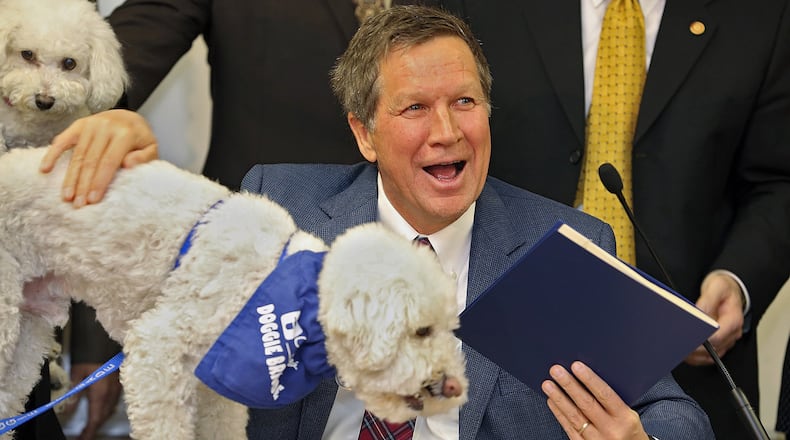Ohio has taken some steps against unfair treatment of animals, such as a ban on keeping veal calves in crates too small for them to turn around and a ban on amputating dairy cows’ tails for non-medical reasons. Both bans started started Jan. 1 when new Ohio Livestock Care Standards rules took effect.
Related: 6 years after bears and tigers set loose in Ohio: what's changed? Other provisions were put into place over the last several years, including stringent laws on private ownership of dangerous wild animals and stricter penalties for cockfighting. A 2012 law also required dog breeders who sell at least nine litter a year to register with the state and be subject to state inspections.
But Humane Society of the United States Chief Executive Wayne Pacelle said the 2012 law is too weak and stronger measures are needed.
Stop Puppy Mills Ohio is proposing a constitutional amendment to require dog breeders — those with eight or more unspayed females and annual sales of more than 15 dogs — to meet animal care standards. It calls for a ban on dog sales from breeders who don’t meet the standards. Stop Puppy Mills Ohio says there are 260 federally-licensed commercial breeders in Ohio.
Related: Anti-puppy mill group gets okay to collect voter signatures The standards include making sure the dogs have adequate food, clean water, veterinarian care, exercise and socialization. The amendment calls for a ban on housing dogs in stacked cages and mandates providing each dog with enough indoor space to turn around, lie down and stretch. It also spells out safe breeding practices.
“These would be some of the strongest animal welfare standards in the country when it comes to dog breeding,” Pacelle said.
Related: Ohio lawmakers roll pet store, cockfighting, bestiality and minimum wage restrictions into one bill Animal welfare groups successfully passed similar regulations with a ballot issue in Missouri in 2010 but state lawmakers there moved to weaken the voter-approved law. Pacelle said that is one reason Stop Puppy Mills is seeking a constitutional amendment — not a citizen-initiated statute — in Ohio.
Petland, an Ohio-based international chain of retail pet stores, does not oppose the ballot measure but believes changes should be made through legislation, not a constitutional amendment, said Petland lobbyist Mike Gonidakis.
Related: Ohio lawmakers look to crack down on cockfighting The campaign is using volunteers to collect the required 305,591 valid voter signatures by the July deadline to get on the November 2018 ballot but it may pay circulators if needed. Pacelle said "We've done 40 or so ballot measures across the country throughout the last 25 years and we have never failed to get the signatures," he said.
For more than a decade, HSUS has pursued a strategy that involves ballot issues and negotiated agreements with major food players, such as Wal-Mart and McDonald’s, to change how animals are handled. Pacelle said major break throughs came when McDonald’s agreed in 2012 to buy pork from suppliers that don’t use gestation crates and in 2015 when it agreed to buy eggs from farms that don’t use battery cages for laying hens by 2025.
Ohio Livestock Care Standards don’t allow for new construction of conventional battery cages.
Related: Anti-puppy mill group gets go-ahead to collect voter signatures In Ohio, one in every eight jobs is linked to agriculture and food production, and the industry generates $123 billion a year in economic impact.
Joe Cornely of the Ohio Farm Bureau said the industry estimates it could cost at least $6 billion to build enough cage-free housing to satisfy commitments made by retailers, restaurants and food service providers over the next decade.
Will those costs be passed on to consumers?
Pacelle said large scale animal farming operations may mean consumers pay less at the cash register now, but there are hidden costs, such as increased pollution, a rise in antibiotic resistant bacteria, and federal ag subsidies.
“We have a rising tide of consciousness toward animals in all sectors of the economy,” Pacelle said. “In every sector of the economy, we are seeing steady movement forward and the puppy mill issue is part of that. A few more things need to happen to cement a new normal within the industry, that treating the animals well is going to be viewed as good business and consumers don’t want a new family member that comes from an inhumane puppy mill.”
About the Author

